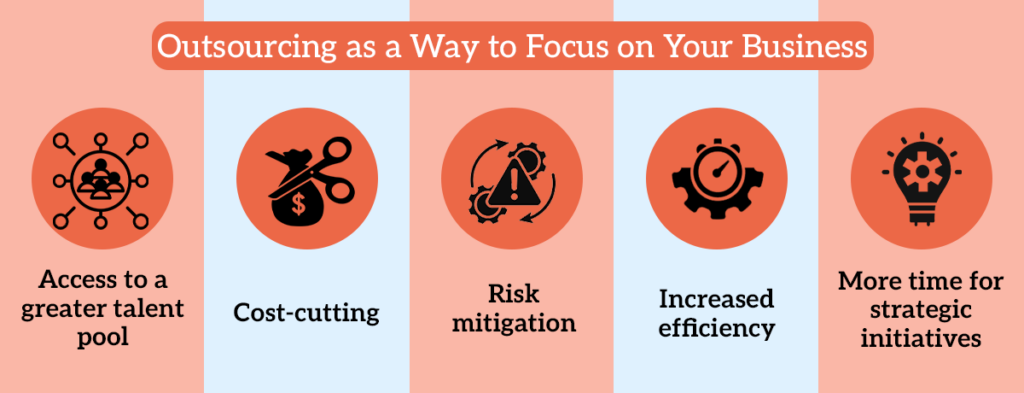5 Ways how Outsourcing can help you focus on your business goals

Cost-cutting, saving time, and improving efficiency are among the main considerations of businesses today. Luckily, outsourcing addresses both of these issues and many more.
In recent times, outsourcing has become one of the main areas where companies seek to improve their bottom line, save costs, and stay competitive. While outsourcing has traditionally been associated with repetitive, low-skilled tasks, more and more businesses are looking for ways to outsource their operations to make the most of new technological developments, ease of communications, and greater availability of a globalized talent pool.
If you have any questions about how outsourcing can help your business or the reasons to hire a virtual assistant, this article is for you. We will discuss the overall change in the trends and how the past few years have fundamentally changed how we approach work – a shift that has changed our approach toward outsourcing.
You need to consider many factors when making a business successful. A successful business strategy inevitably requires a lot of time and effort. It would help to dedicate more time and effort to stay competitive constantly. It can cause you to burn out and miss the larger picture.
However, the issue is, how do you focus on the strategic initiatives and growth of your business while you’re getting inundated with daily, tedious tasks? How do you achieve more with less?
The answer to both questions is outsourcing.
What is Outsourcing?
Simply put, outsourcing is the act of hiring a third party to perform one or more of your business activities, which were previously performed by your in-house team. The extent and benefits of outsourcing may vary depending on your precise business structure and the type of activity outsourced. For example, you can completely outsource your chat support role to someone in a different country, which is a more pronounced form of outsourcing.
The concept of outsourcing business originated around the 1980s. First, companies started to outsource their IT-related functions to other people in other countries. They did it to cut costs and utilize a cheaper talent pool in the developing countries.
With time, outsourcing became more prevalent as businesses began to explore other avenues to delegate a part of their work to third-party sources. The next areas where outsourcing became more widespread were customer services and tech support. However, you must note that outsourcing is not limited to service-based, white-collar jobs. Manufacturing is also one of the main areas that has seen tremendous outsourcing in the past few decades.
There is a slight difference between outsourcing and offshoring. Offshoring can be considered as a subset of outsourcing. Your business can be outsourced without necessarily allocating work to third parties based in a country different than yours.
Outsourcing can work in many ways. You can also partner with another business and allocate a few of your tasks to them. Virtual assistants for small business owners often work in such a capacity. This approach is particularly effective when a task is outside your core competencies. Your business might benefit from outsourcing to an expert third party in such a situation.
Let’s look at different types of outsourcing and how they can help you focus on your business:
Why is Outsourcing Important for Businesses?
In the past few decades, the world has become increasingly economically interdependent. Companies can no longer afford to live in geographical silos. Instead, they must compete at a global level. The increased competition pressures businesses to optimize their processes, establish and maintain competitive advantages, and master their core competencies.
Outsourcing is one-way businesses can deal with increasing expectations and demands that result from a globalized marketplace.
Let’s consider a few statistics that illustrate how outsourcing can help businesses.
- The global process outsourcing business is expected to reach a market value of $525 billion by 2023.
- A survey conducted by Deloitte reported that 65% of the companies cite “being able to focus on their core competencies more” as their primary motive for outsourcing. In comparison, 63% cite “cost-saving” as their central outsourcing imperative.
- Over 1 in 3 small businesses outsource at least one of their business processes.
- 24% of businesses say that outsourcing helps them improve their efficiency. Other factors that prompt outsourcing in businesses include “increasing available expertise” (18%), “flexibility” (16%), and “allowing employees to perform other tasks” (15%).
Different Types of Outsourcing
Geographic outsourcing: This type of outsourcing refers to when a business farms some of its work in a different locality. This could be done for several reasons. A business may shift work to a different location due to a more suitable climate. Moreover, outsourcing helps you use better local business and employment laws, favorable regulations, or a greater availability or ease of access to raw materials.
Process-based outsourcing: Also known as business process outsourcing (BPO), this outsourcing business allows an external service provider for specialized business processes. For example, your business may hire a company from Mexico to outsource your services if most of your customer base is from that country.
Process-based outsourcing is especially beneficial for small businesses. If you’re new and running on a tight budget or lack the necessary skill set to run specific processes, you can take benefits of outsourcing by using a third-party service provider with the requisite expertise.
Logistical outsourcing: Suppose you have a relatively new manufacturing business. Product development is your forte, but you’re not confident about distribution and supply chain management. Or you just don’t want to deal with the hassle of managing a supply chain and its associated risks.
A logistics company can handle your warehousing and transportation needs, allowing you to focus on your core competencies. With logistical outsourcing, you will not get bogged down with tasks without the necessary prowess.
Manufacturing outsourcing: Manufacturing outsourcing allows your business to hire a third party to produce your products. This type of outsourcing is typically observed in the retail, automotive, and electronics sectors. It allows developed countries to outsource manufacturing to businesses in other countries where the production costs are significantly lower.
Outsourcing as a way to focus on your business
- Access to a greater talent pool: As mentioned earlier, businesses need novel ways to stay on top of their game and maintain a competitive edge in an increasingly globalized and economically interdependent world. One of the ways to achieve this is to acquire talent from different countries – a practice that has become mainstream in the past few decades. With the help of fast and effective communication tools, performance monitoring software, and cloud computing, people can now work across geographic lines.
- Cost-cutting: You can now hire from different countries with a much larger talent pool. With outsourcing, you can delegate your business processes to people from other countries, who will cost you a fraction of what an employee of a similar skill level would cost in a developed country. This practice can especially help small businesses that run on thin margins. You can even allocate some of these “saved” funds to strategic growth-orientated initiatives, which will be more likely to pay you dividends in the long run.
- Risk Mitigation: Every business has a set of core competencies. It will be challenging to discover a business that is “a jack of all trades.” Recognizing the areas where you excel and might need external help to run your business effectively is essential. You would not want to put yourself in a position where you’re losing out in the market due to your lack of expertise and necessary know-how about specific processes. Outsourcing can help you mitigate such risks. Not only will you be able to focus more on critical areas of your business, but you will also avoid unnecessary pitfalls that come with a lack of experience and expertise.
- Increased Efficiency: companies often outsource not because of cost savings but because they believe that an external service provider is better suited to run specific business processes. For example, if your business markets its products mainly in China, your main incentive to outsource your customer services to a China-based BPO firm might not be cost-saving. Instead, you should do so to better communicate with your customer base, understand their concerns, and examine local market dynamics. Imagine how difficult it would be to do the same with a local team that is neither able to communicate with your customers nor is it able to understand the workings of the Chinese market.
- More time for strategic initiatives: Your time is limited, and so are your resources. You probably don’t want to allocate most of your time to tedious, daily tasks that can easily be outsourced. It will give you more time to focus on the things that matter. Instead of getting burned out with regular administrative tasks, you can outsource them to someone else and dedicate your time and efforts to the growth and development of your business.
Outsourcing can be challenging, especially if you’re new to it. You’re rightfully concerned about finding quality people and companies to manage your outsourced services.
But don’t worry. We have got you covered.
If you’re interested in outsourcing but are unsure how to begin, consider contacting We Are Working. You can rest assured that their industry-leading global hiring and process management practice will ensure you find the right person for the right job. The best part is that they offer free consultation so that your unique business needs can be considered to create a plan catered to you.
So don’t wait. Book your free consultation today and start taking your business to new heights.




